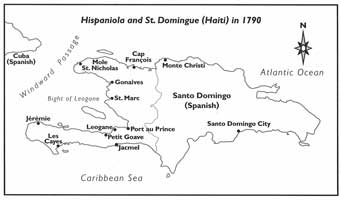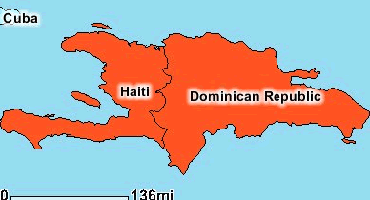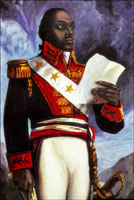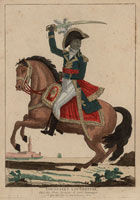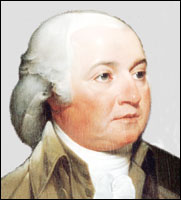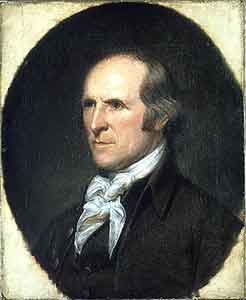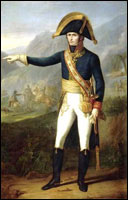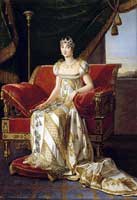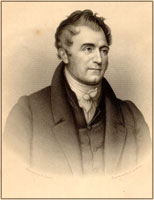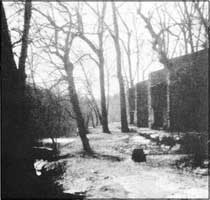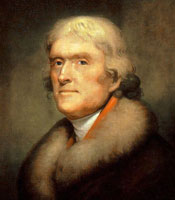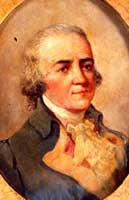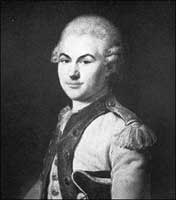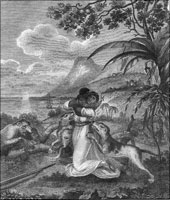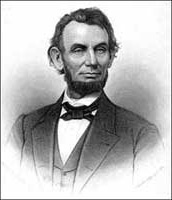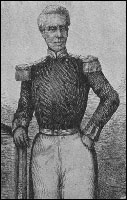| Haitian
Hero Saved the Louisiana Territory for the United States!! |
| Toussaint L'Overture (1743–1803). |
The country that is called Haiti shares an island with the Dominican Republic. When Portuguese Christopher Columbus landed on the island, the New world natives called it Haiti meaning land of high mountains. Columbus renamed it Española, or as it is generally written Hispaniola. In 1511, Española was renamed the Royal Audiencia of Santo Domingo.
Monk Domingo Félix de Guzmán a.k.a. "Santo" Domingo was the founder of the Spanish Inquisition in the 12th century. By naming the island after that notorious Inquisitor, this was a bold challenge to the Almighty that true Christianity would not be allowed to take root in the New World.
Due to their love of gold, the Spanish worked the natives to death; so a Dominican monk named Bartolomé de las Casas suggested importing slaves from Africa to replace the dead natives. Thus the diabolical love of money gave birth to New World slavery.
In 1697, Spain ceded the western part of the island to France, and the name of this new French colony was called Saint-Domingue. From that time onward, the island was a house divided.
|
In 1804, the name of the country was changed to Haiti, meaning "land of high mountains."
General L'Ouverture HATED the diabolical voodoo religion and he tried to outlaw it by making Roman Catholicism the state religion. Unfortunately, Bibles were banned from the French colony, and general L'Ouverture had no way of knowing that Roman Catholicism was voodoo disguised as Christianity!!
|
|
A few people in the U.S. government favored a black-run independent state in the Caribbean. One of them was Timothy Pickering, secretary of state under President Adams.
Pickering, indeed, was well ahead of his president in promoting St. Domingo's independence. His father had been an abolitionist minister, he himself had proposed the abolition of slavery in the Northwest Territories, and the prospect of a black-run state in the neighborhood was not as frightening to him as it was to the largely Republican southerners. Pickering's enthusiasm for Toussaint's rebellion in fact was such that he had given the British minister in Washington reason to worry, as early as 1797, that he favored "a regime of blacks in St. Domingo."(Brown, Toussaint's Clause, p. 146).
Adams fired Pickering for his pro-Toussaint campaign.
Racists like Alexander Hamilton and Albert Gallatin were also vehemently opposed to recognition of the independence of Saint-Domingo.
After failing to obtain any help from the United States, Toussaint submitted his Constitution to Napoleon Bonaparte for approval. Napoleon, and his boss, Charles Maurice de Tallyrand, hated the idea of freedom and democracy and he treated the new Constitution with utter contempt.
Saint-Domingue was the key to the conquest of New Orleans!!
In a secret treaty signed in 1800, King Carlos IV ceded the Louisiana Territory to Napoleon Bonaparte. Napoleon planned on invading New Orleans, but he needed a rendezvous point for his invasion armada. That rendezvous point was the French colony of Saint-Domingue.
The Haitian Revolution, and the Constitution of L'Ouverture, was about to upset the carefully laid schemes of Spain, France, and Britain.
In 1797, Napoleon married his step-sister Pauline to one of his top generals, Charles Victoire Leclerc. The couple were then ordered to lead a vast invasion armada to subdue Saint-Domingue as a springboard to the invasion of New Orleans.
|
Pauline—as the step-sister of Napoleon—was given secret orders that she would be ruling more than a small yellow fever infested island. The initial invasion armada consisted of 74 ships and 20,000 professional soldiers:
Careful arrangements had been made to supply the invasion armada with gunpowder from the United States!The troops about to embark belonged to the most effective fighting force of its time, one fashioned by a decade of revolutionary warfare. During the French Revolution the nobles and foreign mercenaries of the old Bourbon army had given way to young bourgeois volunteers who fought well because they did so for liberté and nation, not king and country. The introduction of the military draft had also dramatically increased the size of the French army, slated to total 320,000 men in 1802 despite the peace with England. Instead of drilling professional troops into obedient tin soldiers, innovative tactics encouraged citizen-soldiers and officers to display initiative on the battlefield, while the creation of the demi-brigade (an independent fighting force that is the ancestor of the modern division) made for a mobile, versatile force. This army, which had repeatedly humiliated the great powers of Europe, was the formidable force about to be thrust upon Louverture. (Girard, The Slaves Who Defeated Napoleon, p. 55).
The Du Pont gunpowder plot!!
As this vast invasion armada was setting out to conquer Saint-Domingue and New Orleans, Napoleon was able to establish a gunpowder factory to supply his army . . . in the U.S. state of Delaware!
|
From such small beginnings, the Du Pont gunpowder factory grew to be an industrial colossus that dominated the U.S. and world economy.
President Jefferson was not in the least interested in sending Bibles to Saint-Domingue. The President was a very close friend of the Du Pont family and Pierre took part in the Louisiana Purchase negotiations with Bonaparte.
|
President Jefferson had absolutely no interest in supporting a slave revolt right in his own backyard:
The young French ambassador to the United States, Louis-André Pichon, brought up the matter of the Saint-Domingue expedition during his first encounter with Jefferson and was pleased to report that Jefferson had compared Saint-Domingue to "another Algiers in the seas of America" in reference to the piratical Barbary states."There is no support for Toussaint in the United States," Jefferson rather incorrectly stated. "Isn't his example dangerous for two-thirds of the states?" Informed of the conversation, Bonaparte and Talleyrand optimistically told the commander of the expedition that Jefferson had pledged to supply the French army while "starving" Louverture (he had not) and that all logistical problems were solved. (Girard, The Slaves Who Defeated Napoleon, p. 51).
The huge Du Pont conglomerate (the merchants of death) became the main supplier of explosives to Germany during WWI, and they also were the main supplier of explosives to Nazi Germany during WWII. They were also one of the chief developers of the atomic bombs that were dropped on Japan in 1945.
The Du Pont conglomerate also bankrolled General Motors. General Motors killed the electric car by driving all the electric car companies out of business . . . and thereby polluted the entire planet with gasoline cars!!
Toussaint L'Overture was lured to France and died in prison!!
Before the brutal general Leclerc succumbed to yellow fever, he arrested general L'Overture and sent him to France:
In July 1802, the ship of the line Le Héros cast anchor in Brest after a twenty-day crossing from Cap-Français. On board was the most famous of the Saint-Domingue exiles, Toussaint Louverture, whom Victoire Leclerc had deported on suspicions that he was planning to resume his rebellion. The voyage had been unpleasant for Louverture, who had been kept below decks with lowly sailors when such a prominent prisoner would normally have dined at the captain's table. His wife, Suzanne; sons Placide, Isaac, and Saint-Jean; and nieces Louise Chancy and Victorine Thusac had traveled on the same ship. (Girard, The Slaves Who Defeated Napoleon, p. 267).
Upon his arrival in France, Napoleon refused to meet with him and he was thrown into a cold dark prison near the Swiss Alps.
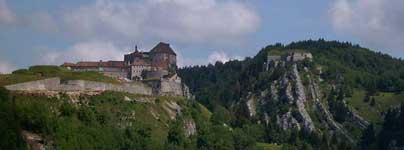
The Fort-de-Joux was
as foreboding as the Bastille.
L'Overture was separated from his family and thrown into a cold dark prison:
Louverture's health worsened with each passing month. His head hurt constantly, as did his stomach; he was also plagued by a dry cough that would not go away.The return of spring might have breathed new life into his shivering body, but Louverture was destined never to see the end of a European winter. At 11:30 a.m. on April 7, 1803, as he entered Louverture's cell to deliver his daily food allowance, Amiot found him sitting by the fireplace, his head leaning on the mantle, immobile. Doctors called in from nearby Pontarlier pronounced him dead a few hours later. An autopsy revealed that his lungs had filled with blood and concluded that he had died of pneumonia and apoplexy (a catchall term for internal hemorrhaging). (Girard, The Slaves Who Defeated Napoleon, p. 279).
General L'Overture's few belongings were auctioned off and his body buried in the fort's chapel. The chapel was later destroyed in a renovation, so the exact location of his body remains a mystery to this day.
Rochembeau used vicious dogs to suppress Haitian independence!!
In November 1802, general Donatein de Rochembeau arrived in Saint-Domingo to replace the dead general Leclerc.
He was augmented by a Polish division commanded by general Władysław Jabłonowski consisting of 2,600 men, and the total strength of the new invasion army was about 20,000 soldiers.
|
So obsessed was general de Rochembeau with suppressing the independence of Haiti that he imported massive bloodhounds from Cuba:
The use of dogs as combat auxiliaries had a long history in the Caribbean, most famously in Spain's and Britain's wars against Tainos and Maroons, and they were remarkably well suited for the counterinsurgency operations waged in Saint-Domingue. Although his instructions said nothing on the topic, Noailles thus took it upon himself to request four hundred dogs from the governor of Cuba. In February 1803, a first shipment of two hundred left with their Cuban conductors for Cap, where they were destined to become the main actors in the most notorious of Rochambeau's crimes.(Girard, The Slaves Who Defeated Napoleon, p. 240-141).
Again, our great JEHOVAH came to the rescue of Saint-Domingo by smiting this new invasion army with yellow fever. The dogs became so confused as to the identity of friend or foe and they turned out to be useless in the end.
President Lincoln recognized the Haitian Republic in 1861
After the rebels fired on Fort Sumter, President Lincoln went ahead and finally established diplomatic relations with the Haitian Republic.
|
By that time the island was once again divided, with Spain claiming the eastern half. Instead of being a PARADISE ISLAND, the voodoo religion and Roman Catholicism had turned the island into a literal hell. The Savour said:
And Joshua knew their thoughts, and said unto them, Every kingdom divided against itself is brought to desolation; and every city or house divided against itself shall not stand (Matthew 12:25).
Vital links
References
Bell, Madison Smartt. Toussaint L'Ouverture: A Biography. Pantheon Books, New York, 2007.
Brown, Gordon S. Toussaint's Clause: The Founding Fathers and the Haitian Revolution. University Press of Mississippi, Jackson, MIssissippi, 2005.
Colby, Gerard, The Du Pont Dynasty: Behind the Nylon Curtain: Lyle Stuart, Secaucus, New Jersey, 1984.
Girard, Philippe R. The Slaves Who Defeated Napoleon: Toussaint L'Overture and the Haitian War of Independence, 1801–1804. University of Alabama Press, Tuscaloosa, 2011.
Fraser, Flora. Pauline Bonaparte: Venus of Empire. Alfred A. Knopf, New York, 2009.
James, C.L.R. The Black Jacobins: Toussaint L'Ouverture and the San Domingo Revolution. Random House, New York, 1963.
Copyright © 2013 by Patrick Scrivener
